Historical Analysis: The Atlanta Compromise Speech and its Impact
VerifiedAdded on 2020/04/15
|5
|958
|71
Essay
AI Summary
This essay analyzes the Atlanta Compromise Speech, focusing on the perspectives of Booker T. Washington and W.E.B. DuBois regarding racial relations in the post-Civil War South. The paper addresses key questions, including the ethical theories underpinning each speaker's viewpoint, their specific arguments for African American advancement, and their responses to the white community's fears and concerns. It examines the pros and cons of each speech, their long-term impacts, and the differing views of Washington and DuBois. The analysis highlights the importance of understanding intercultural perspectives and the need for equality, while also discussing the concept of compromise and the differing approaches to achieving racial equality. References to relevant scholarly sources are included.
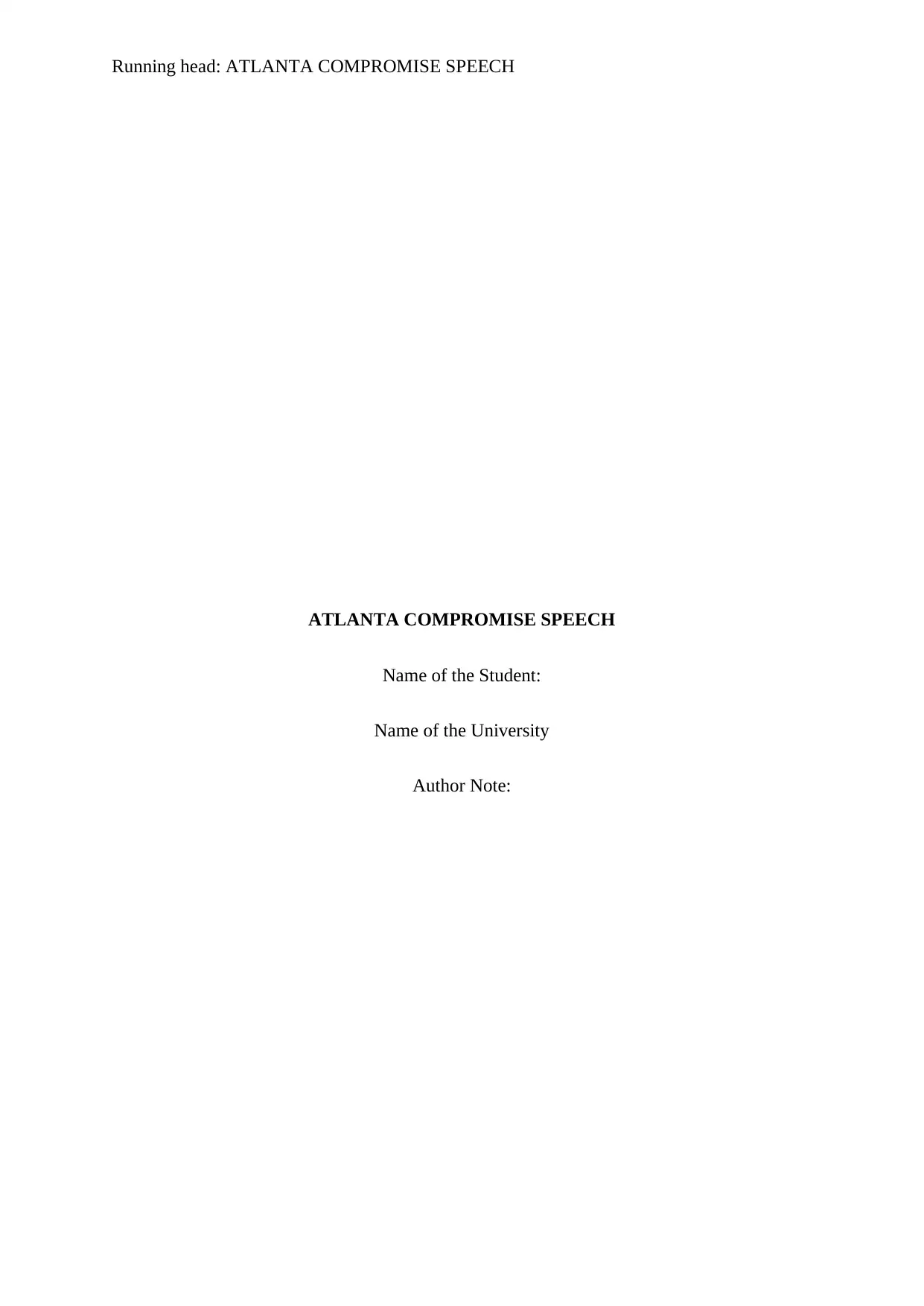
Running head: ATLANTA COMPROMISE SPEECH
ATLANTA COMPROMISE SPEECH
Name of the Student:
Name of the University
Author Note:
ATLANTA COMPROMISE SPEECH
Name of the Student:
Name of the University
Author Note:
Paraphrase This Document
Need a fresh take? Get an instant paraphrase of this document with our AI Paraphraser
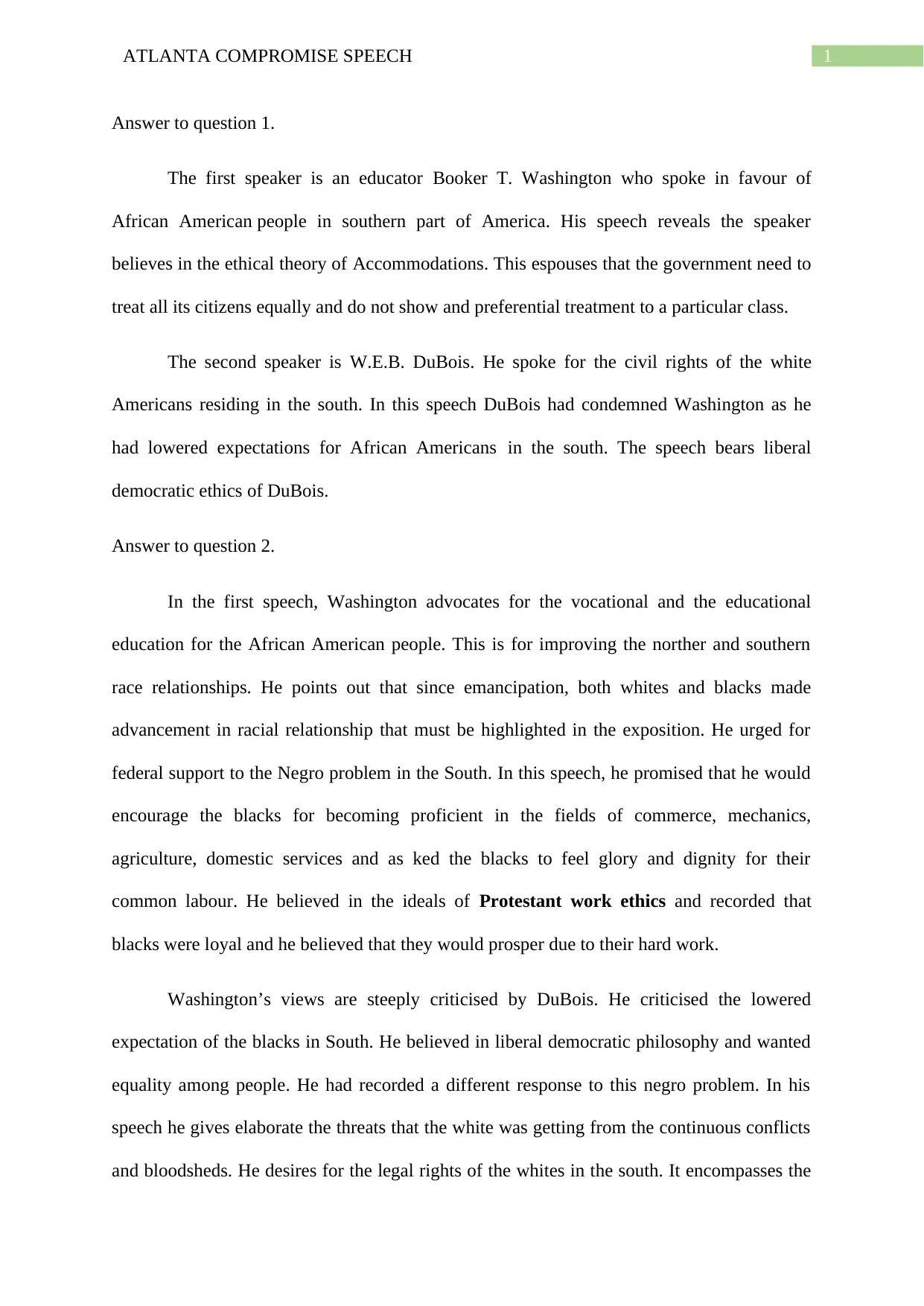
1ATLANTA COMPROMISE SPEECH
Answer to question 1.
The first speaker is an educator Booker T. Washington who spoke in favour of
African American people in southern part of America. His speech reveals the speaker
believes in the ethical theory of Accommodations. This espouses that the government need to
treat all its citizens equally and do not show and preferential treatment to a particular class.
The second speaker is W.E.B. DuBois. He spoke for the civil rights of the white
Americans residing in the south. In this speech DuBois had condemned Washington as he
had lowered expectations for African Americans in the south. The speech bears liberal
democratic ethics of DuBois.
Answer to question 2.
In the first speech, Washington advocates for the vocational and the educational
education for the African American people. This is for improving the norther and southern
race relationships. He points out that since emancipation, both whites and blacks made
advancement in racial relationship that must be highlighted in the exposition. He urged for
federal support to the Negro problem in the South. In this speech, he promised that he would
encourage the blacks for becoming proficient in the fields of commerce, mechanics,
agriculture, domestic services and as ked the blacks to feel glory and dignity for their
common labour. He believed in the ideals of Protestant work ethics and recorded that
blacks were loyal and he believed that they would prosper due to their hard work.
Washington’s views are steeply criticised by DuBois. He criticised the lowered
expectation of the blacks in South. He believed in liberal democratic philosophy and wanted
equality among people. He had recorded a different response to this negro problem. In his
speech he gives elaborate the threats that the white was getting from the continuous conflicts
and bloodsheds. He desires for the legal rights of the whites in the south. It encompasses the
Answer to question 1.
The first speaker is an educator Booker T. Washington who spoke in favour of
African American people in southern part of America. His speech reveals the speaker
believes in the ethical theory of Accommodations. This espouses that the government need to
treat all its citizens equally and do not show and preferential treatment to a particular class.
The second speaker is W.E.B. DuBois. He spoke for the civil rights of the white
Americans residing in the south. In this speech DuBois had condemned Washington as he
had lowered expectations for African Americans in the south. The speech bears liberal
democratic ethics of DuBois.
Answer to question 2.
In the first speech, Washington advocates for the vocational and the educational
education for the African American people. This is for improving the norther and southern
race relationships. He points out that since emancipation, both whites and blacks made
advancement in racial relationship that must be highlighted in the exposition. He urged for
federal support to the Negro problem in the South. In this speech, he promised that he would
encourage the blacks for becoming proficient in the fields of commerce, mechanics,
agriculture, domestic services and as ked the blacks to feel glory and dignity for their
common labour. He believed in the ideals of Protestant work ethics and recorded that
blacks were loyal and he believed that they would prosper due to their hard work.
Washington’s views are steeply criticised by DuBois. He criticised the lowered
expectation of the blacks in South. He believed in liberal democratic philosophy and wanted
equality among people. He had recorded a different response to this negro problem. In his
speech he gives elaborate the threats that the white was getting from the continuous conflicts
and bloodsheds. He desires for the legal rights of the whites in the south. It encompasses the
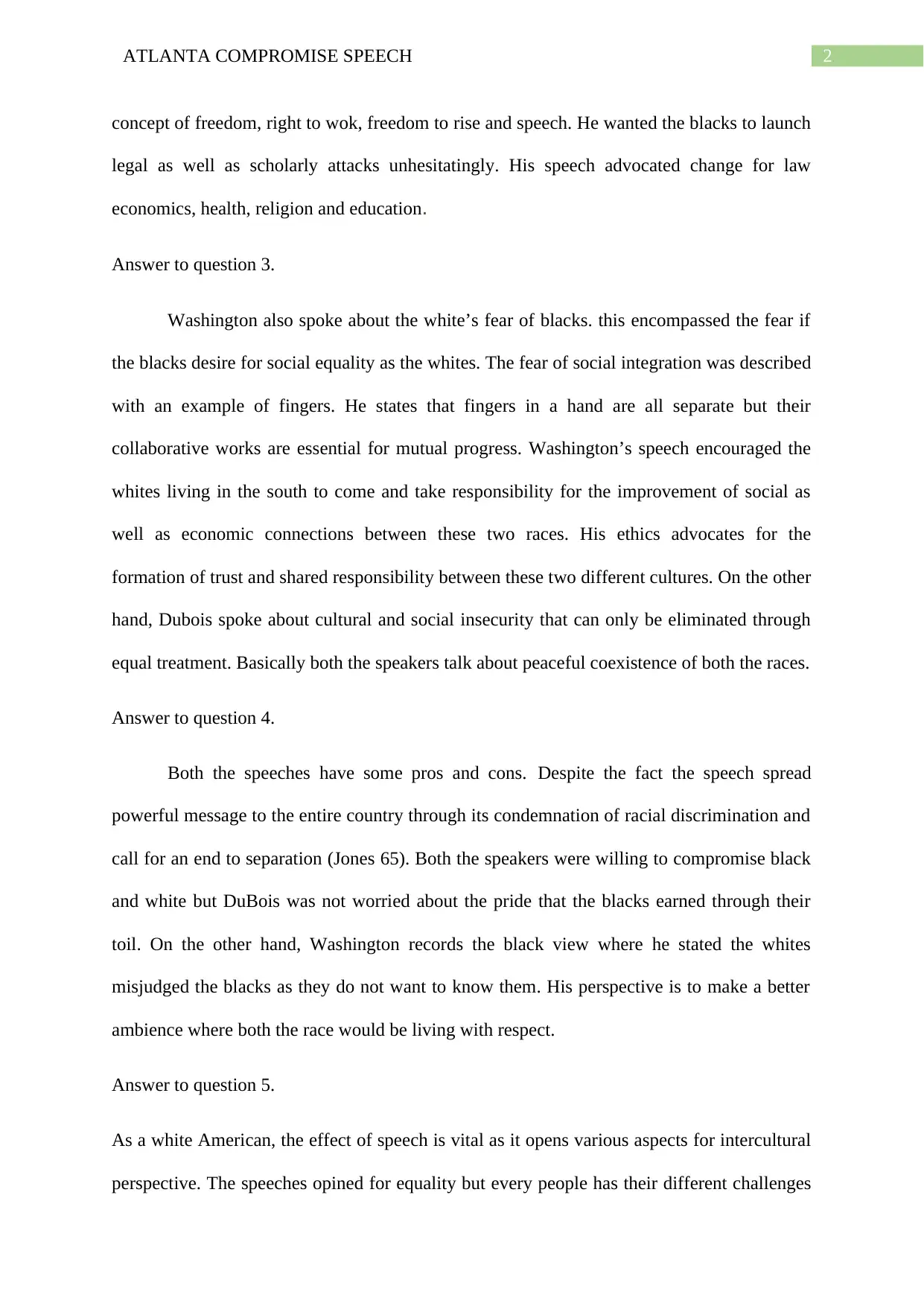
2ATLANTA COMPROMISE SPEECH
concept of freedom, right to wok, freedom to rise and speech. He wanted the blacks to launch
legal as well as scholarly attacks unhesitatingly. His speech advocated change for law
economics, health, religion and education.
Answer to question 3.
Washington also spoke about the white’s fear of blacks. this encompassed the fear if
the blacks desire for social equality as the whites. The fear of social integration was described
with an example of fingers. He states that fingers in a hand are all separate but their
collaborative works are essential for mutual progress. Washington’s speech encouraged the
whites living in the south to come and take responsibility for the improvement of social as
well as economic connections between these two races. His ethics advocates for the
formation of trust and shared responsibility between these two different cultures. On the other
hand, Dubois spoke about cultural and social insecurity that can only be eliminated through
equal treatment. Basically both the speakers talk about peaceful coexistence of both the races.
Answer to question 4.
Both the speeches have some pros and cons. Despite the fact the speech spread
powerful message to the entire country through its condemnation of racial discrimination and
call for an end to separation (Jones 65). Both the speakers were willing to compromise black
and white but DuBois was not worried about the pride that the blacks earned through their
toil. On the other hand, Washington records the black view where he stated the whites
misjudged the blacks as they do not want to know them. His perspective is to make a better
ambience where both the race would be living with respect.
Answer to question 5.
As a white American, the effect of speech is vital as it opens various aspects for intercultural
perspective. The speeches opined for equality but every people has their different challenges
concept of freedom, right to wok, freedom to rise and speech. He wanted the blacks to launch
legal as well as scholarly attacks unhesitatingly. His speech advocated change for law
economics, health, religion and education.
Answer to question 3.
Washington also spoke about the white’s fear of blacks. this encompassed the fear if
the blacks desire for social equality as the whites. The fear of social integration was described
with an example of fingers. He states that fingers in a hand are all separate but their
collaborative works are essential for mutual progress. Washington’s speech encouraged the
whites living in the south to come and take responsibility for the improvement of social as
well as economic connections between these two races. His ethics advocates for the
formation of trust and shared responsibility between these two different cultures. On the other
hand, Dubois spoke about cultural and social insecurity that can only be eliminated through
equal treatment. Basically both the speakers talk about peaceful coexistence of both the races.
Answer to question 4.
Both the speeches have some pros and cons. Despite the fact the speech spread
powerful message to the entire country through its condemnation of racial discrimination and
call for an end to separation (Jones 65). Both the speakers were willing to compromise black
and white but DuBois was not worried about the pride that the blacks earned through their
toil. On the other hand, Washington records the black view where he stated the whites
misjudged the blacks as they do not want to know them. His perspective is to make a better
ambience where both the race would be living with respect.
Answer to question 5.
As a white American, the effect of speech is vital as it opens various aspects for intercultural
perspective. The speeches opined for equality but every people has their different challenges
⊘ This is a preview!⊘
Do you want full access?
Subscribe today to unlock all pages.

Trusted by 1+ million students worldwide
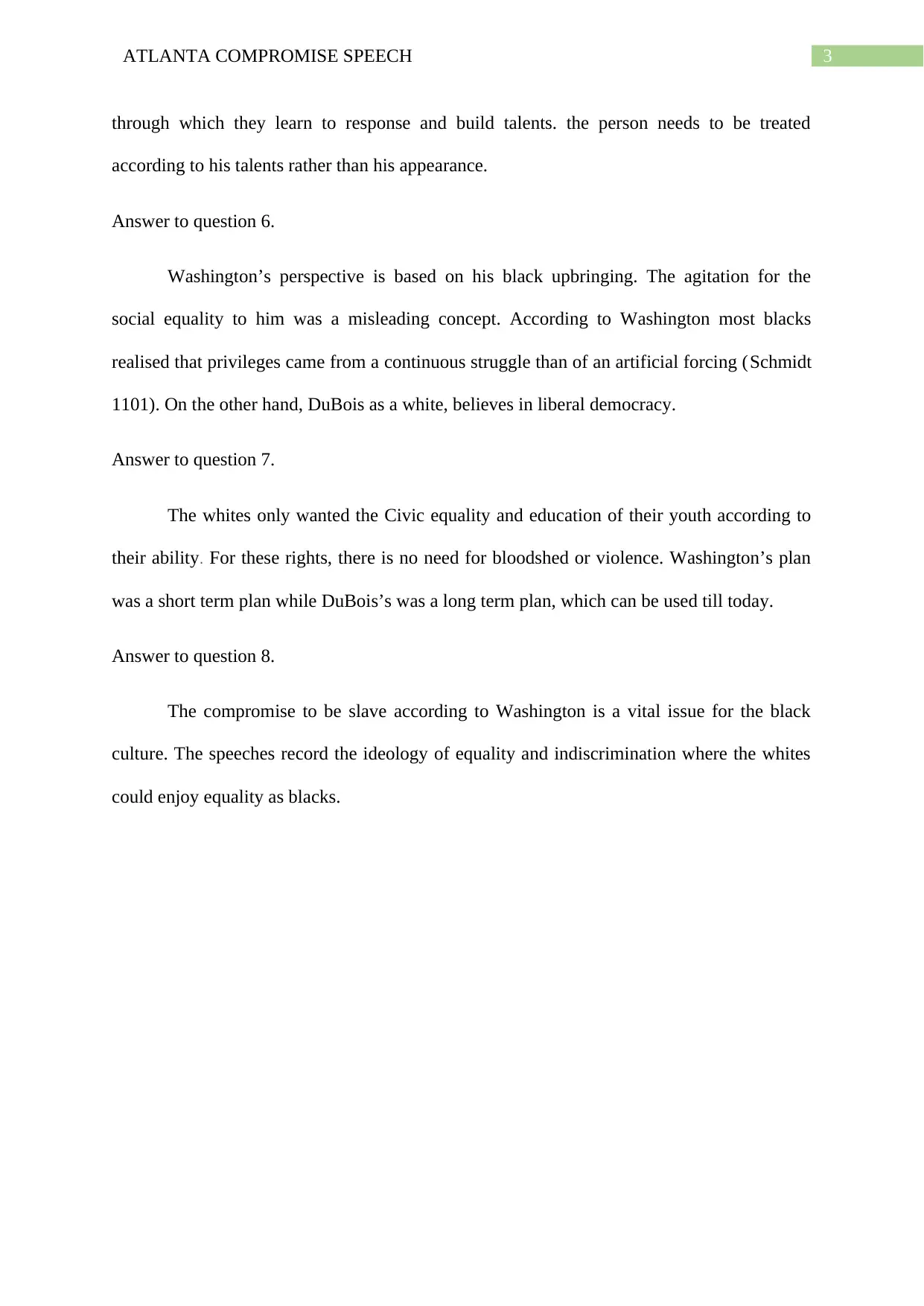
3ATLANTA COMPROMISE SPEECH
through which they learn to response and build talents. the person needs to be treated
according to his talents rather than his appearance.
Answer to question 6.
Washington’s perspective is based on his black upbringing. The agitation for the
social equality to him was a misleading concept. According to Washington most blacks
realised that privileges came from a continuous struggle than of an artificial forcing (Schmidt
1101). On the other hand, DuBois as a white, believes in liberal democracy.
Answer to question 7.
The whites only wanted the Civic equality and education of their youth according to
their ability. For these rights, there is no need for bloodshed or violence. Washington’s plan
was a short term plan while DuBois’s was a long term plan, which can be used till today.
Answer to question 8.
The compromise to be slave according to Washington is a vital issue for the black
culture. The speeches record the ideology of equality and indiscrimination where the whites
could enjoy equality as blacks.
through which they learn to response and build talents. the person needs to be treated
according to his talents rather than his appearance.
Answer to question 6.
Washington’s perspective is based on his black upbringing. The agitation for the
social equality to him was a misleading concept. According to Washington most blacks
realised that privileges came from a continuous struggle than of an artificial forcing (Schmidt
1101). On the other hand, DuBois as a white, believes in liberal democracy.
Answer to question 7.
The whites only wanted the Civic equality and education of their youth according to
their ability. For these rights, there is no need for bloodshed or violence. Washington’s plan
was a short term plan while DuBois’s was a long term plan, which can be used till today.
Answer to question 8.
The compromise to be slave according to Washington is a vital issue for the black
culture. The speeches record the ideology of equality and indiscrimination where the whites
could enjoy equality as blacks.
Paraphrase This Document
Need a fresh take? Get an instant paraphrase of this document with our AI Paraphraser
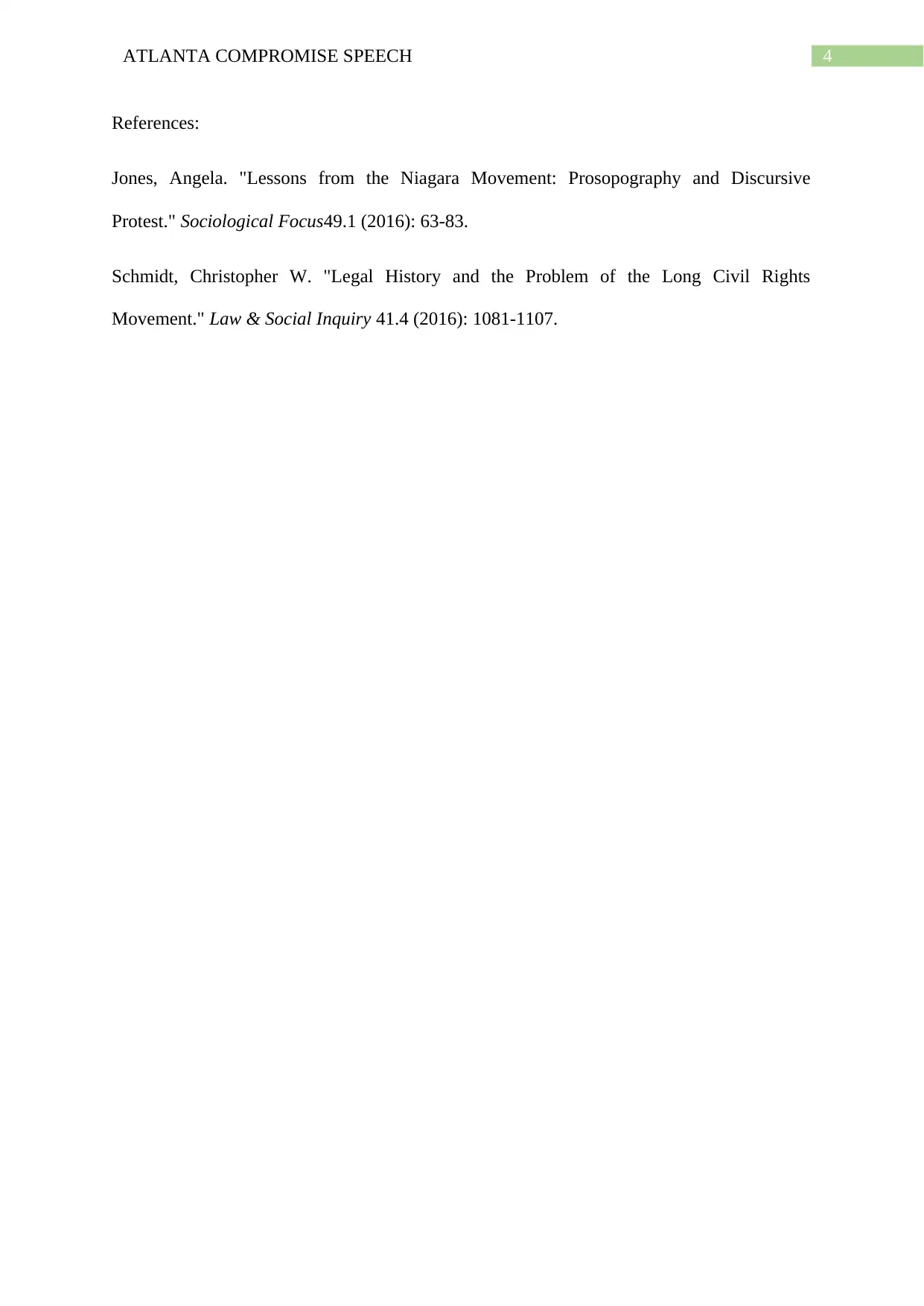
4ATLANTA COMPROMISE SPEECH
References:
Jones, Angela. "Lessons from the Niagara Movement: Prosopography and Discursive
Protest." Sociological Focus49.1 (2016): 63-83.
Schmidt, Christopher W. "Legal History and the Problem of the Long Civil Rights
Movement." Law & Social Inquiry 41.4 (2016): 1081-1107.
References:
Jones, Angela. "Lessons from the Niagara Movement: Prosopography and Discursive
Protest." Sociological Focus49.1 (2016): 63-83.
Schmidt, Christopher W. "Legal History and the Problem of the Long Civil Rights
Movement." Law & Social Inquiry 41.4 (2016): 1081-1107.
1 out of 5
Your All-in-One AI-Powered Toolkit for Academic Success.
+13062052269
info@desklib.com
Available 24*7 on WhatsApp / Email
![[object Object]](/_next/static/media/star-bottom.7253800d.svg)
Unlock your academic potential
Copyright © 2020–2026 A2Z Services. All Rights Reserved. Developed and managed by ZUCOL.

